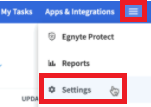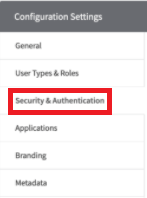Configuring SAML SSO with Egnyte and PingFederate
Learn how to enable Egnyte sign-on from a PingFederate URL (IdP-initiated sign-on) and direct Egnyte sign-on using PingFederate (SP-initiated sign-on).
Before you begin
-
Configure PingFederate to authenticate against an IdP or datastore containing the users requiring application access.
-
Populate Egnyte with at least one user to test access.
-
You must have administrative access to PingFederate and Egnyte.
Create an SP connection for Egnyte
-
Sign on to the PingFederate administrative console.
-
Create an SP connection for Egnyte in PingFederate.
-
Configure using Browser SSO profile SAML 2.0.
-
Set Partner’s Entity ID to
https://saml-auth.egnyte.com. -
Enable the following SAML Profiles:
-
IdP-Initiated SSO
-
SP-Initiated SSO
-
-
In Assertion Creation → Authentication Source Mapping → Attribute Contract Fulfillment, map the SAML_SUBJECT to the attribute containing the user’s email address.
-
In Protocol Settings → Assertion Consumer Service URL, set Binding to POST and set Endpoint URL to
https://your-Egnyte-domain.egnyte.com/samlconsumer/PingFederate. -
In Protocol Settings → Allowable SAML Bindings, enable POST.
-
In Credentials → Digital Signature Settings, select the PingFederate Signing Certificate.
-
-
Save the configuration.
-
Export the signing certificate.
-
Export and then open the metadata file and copy the value of the entityID and the Location entry (
https://your-value/idp/SSO.saml2).
Add the PingFederate connection to Egnyte
-
Sign on to your Egnyte Admin organization as an administrator.
-
Click the menu icon and then click Settings.

-
Click the Security and Authentication tab.

-
In the Single sign-on authentication list, select SAML 2.0.
-
In the Identity provider list, select Ping Identity.
-
Set the following values:
Field Value Identity provider login URL
The Location value from the metadata that you exported.
Identity provider entity ID
The entityID value from the metadata that you exported.
Identity provider certificate
In a text editor, open the signing certificate that you downloaded in a text editor. Copy and paste the contents.
Default user mapping
Email address
-
Click Save.
-
Go to Settings → Users and Groups.
-
Select the appropriate users and set their AuthType to SSO.